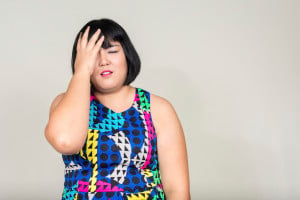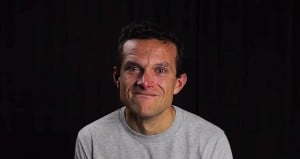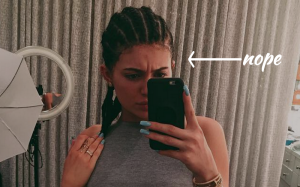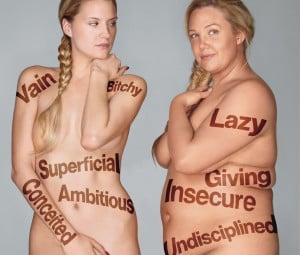Panel 1
A woman (Alli) is speaking directly to the camera, holding an x-ray film of a torso with the word “ow” written in place of one of the vertebrae.
Alli: Hi, I’m Alli, your cartoonist, and I have a benign tumor in my spine that makes me hurt pretty much all the time. Today I’m going to talk about a few things that people say to chronic pain sufferers and why saying stuff like this can be problematic.
Panel 2
Alli is holding the lowered x-ray in one arm, gesturing with the other arm.
Alli: Now, most of these things are said with good intentions and out of concern, but just because something is meant to be kind doesn’t mean that’s how it will be interpreted. When in doubt it’s always best to err on the side of not being abelist.
Panel 3
A man is immobilizing his right arm by holding it in place with his left arm speaking to a woman who is offering him a bottle of painkillers.
Man: Sorry, I can’t come out tonight. My shoulder is acting up.
Woman: Have an aspirin. That should fix it.
Panel 4
Alli is holding up a prescription bottle and a sack marked “RX.”
Alli: Offering over the counter painkillers seems nice, but it suggests that you think that people with chronic pain don’t know how to take care of themselves and it minimizes our problems – if an over the counter pill was going to help we’d have already taken one.
Panel 5
A woman is speaking to another woman, who is holding a rolled-up yoga mat.
Woman 1: I used to play hockey before my arthritis got too bad.
Woman 2: Have you tried yoga? It’s great for your joints!
Panel 6
Alli is sitting on a swiss ball and holding a kettle ball.
Alli: Yoga (and Pilates, and crossfit) is a very demanding activity that isn’t recommended for a lot of chronically painful conditions. Physical therapy can be very helpful in some cases, but no amount of exercise is going to resolve my tumor or “fix” the root causes behind a lot of chronically painful conditions. If you say that someone with chronic pain needs to work out to cure their pain you’re implying that they’re lazy and you may be grossly misunderstanding their condition.
Panel 7
One man is speaking to a second man, who is carrying a box.
Man 1: With your bad knee you shouldn’t be lifting that! Let me get it.
Panel 8
Alli is carrying a large water bottle on her shoulder.
Alli: Just because someone has chronic pain doesn’t mean they aren’t strong or that they need help with every task. We don’t need you to assume that we can’t do day-to-day tasks. We need you to ask us if we need your help or support, and then respect our answer – even if its not what you expected.
Panel 9
A woman is speaking to another woman, who is using a cane.
Woman 1: On Dr. Oz I heard about a woman who cured her pain by drinking carrot juice. You should try that!
Panel 10
Alli is standing while examining a table full of nostrums and juices.
Alli: It’s great that you care about your friend and you want to let them know you wish they weren’t in pain but there’s a lot of snake oil and pseudoscience out there, some of which is really dangerous. We’re glad you care but if there’s a treatment that works we’ve probably already investigated it.
Panel 11
A woman is speaking to a man on a beach, both dressed for swimming.
Woman: I’ve got to call it a day, my back’s really hurting.
Man: C’mon, you can tough it out! Mind over matter!
Panel 12
Alli is scratching her head and looking incredulous.
Alli: I can’t really think of a situation where this is an appropriate thing to say to anyone, but it’s an awful thing to say to someone with chronic pain. Don’t say this. This is a jerky thing to say. Your mind IS matter and pain is how your body tells you to give it a rest. An athlete in training may be willing to push through pain, but for someone with chronic pain “toughing it out” can have lasting consequences that lower our quality of life and increase the pain we cope with for weeks or months to come.
Panel 13
The chronic pain sufferers from the previous panels appear now as talking heads, speaking directly to the camera.
Man from Panel 3: There are lots of conditions that cause chronic pain – arthritis, injuries, and fibromyalgia are just a few.
Woman from Panel 5: Some chronic conditions are more common in older adults but people of all ages can suffer from chronic pain.
Man from Panel 7: Pain knows no gender – telling someone to “man up” when they are in pain is gross.
Woman from Panel 9: Fat people are no more likely to have chronic pain than thin people are, and no one should be judged for their pain.
Woman from Panel 11: Chronic pain doesn’t exist in a vacuum and it doesn’t stay constant – some days are worse than others and you need to respect it if we say we’ve reached our limit.
Panel 14
Alli is shrugging and speaking to the camera.
Alli: Keep in mind that people in chronic pain know their bodies better than you do and innocent assumptions can do a lot of unintentional damage. If you want to support us, don’t make assumptions – just ask us how you can be supportive. We’re diverse folks with different bodies, different types of pains, different identities, and different needs; there’s no one-size-fits-all solution to being inclusive to people with chronic pain, but being kind and listening to what we say is a pretty good start.





















